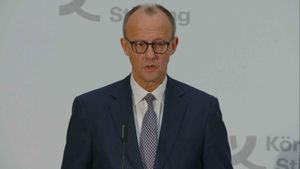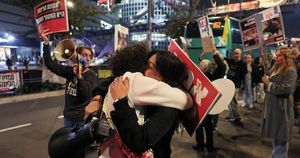Castigated for abandoning its diversity, equity, and inclusion initiatives, Target finds itself at the center of controversy as calls grow for a boycott spearheaded by civil rights activists. Pastor Dr. Jamal Bryant, leader of New Birth Missionary Baptist Church, led the charge, announcing plans for a 40-day boycott of the retail giant, citing its recent decision to conclude DEI policies as “spitting in the face of Black people.” Target’s rollback is viewed as part of broader shifts among corporations responding to pressure from conservative groups and the Trump administration.
Pastor Dr. Bryant, during his sermon titled “I Feel Targeted,” emphasized the significance of economic power, declaring, “What we learned from the Montgomery bus boycotts is racist America doesn’t respond to speeches. They respond to dollars.” The pastor highlighted the substantial financial contributions from Black consumers, who spend about $800 million at Target monthly, urging them to redirect their spending to Black-owned businesses instead.
Target’s announcement previously indicated the ending of programs initially intended to uplift Black employees and promote Black-owned businesses, initiatives launched as part of its commitment following the tragic killing of George Floyd. Kiera Fernandez, Target’s Chief Community Impact and Equity Officer, described the alteration of their DEI strategy as part of “a next chapter” aimed at creating inclusive work environments. Despite this, many view the changes—characterized by opponents as cowardly—as deviations from the company’s earlier commitments to diversity.
Echoing Pastor Dr. Bryant, civil rights attorney Nekima Levy Armstrong expressed dismay at Target's latest move, emphasizing the impact of political dynamics on corporate decision-making. “But instead they acted cowardly, and they made the decision to bow down to the Trump administration. Well, we are here today saying we will not bow down, and we will not turn around,” she stated. The calls for boycotts have ignited responses from activists, particularly in Minneapolis, where Target's corporate headquarters is located.
The debate surrounding DEI initiatives has intensified, especially following recent legal decisions—like the Supreme Court ruling against affirmative action—which emboldened conservative groups to combat corporate practices aimed at increasing minority representation. Major companies, including Walmart and Ford, have also begun scaling back their DEI commitments, aligning their policies with the changing political and social landscapes.
Target has historically positioned itself as a leading advocate for the rights of Black and LGBTQ+ individuals. The company's strategy had evolved significantly since 2020 when DEI programs were introduced amid widespread civil unrest following Floyd's death. At the time, Target pledged to invest $2 billion to support Black communities by 2025, raising concerns among many as the company now signals its retreat from such promises.
Activist Pastor Dr. Bryant has unequivocally called for immediate changes, stating, “Target, you got 40 days to pull it together, because you made a commitment after the death of George Floyd,” and reminding listeners of the firm’s responsibility to uphold its financial promises to communities of color. He not only advocates for the boycott but calls on participants to divest from Target’s stocks, remarking, “I want the stock to go down because we are standing in righteous indignation against racism and sexism.”
The mask of corporate solidarity is being tested once again as companies navigate the complex space of political pressures and consumer expectations. While some firms, like Costco and JPMorgan, maintain their commitments to DEI, others yield to the pressures, reflecting the visible divide within corporate America. Target's contraction of its initiatives may be seen not only as capitulation but as indicative of the challenges facing companies committed to social equity amid rising conservative sentiment.
The potential ramifications of the proposed boycott remain to be seen as Pastor Dr. Bryant and others call for unity and action against perceived corporate failures. “You can buy Black-owned paper towels and toilet paper and soap and dishwashing detergent,” Dr. Bryant urged those considering the boycott, encouraging them to create their economic ecosystem. This sustainability focus is echoed by many activists, who see the upcoming boycott as much more than just resistance against Target; it aims to nurture Black businesses and economic independence moving forward.
This current conflict surrounding Target serves as a microcosm of the nationwide debate over DEI initiatives as companies grapple with their responsibilities and the narrative they wish to uphold. The upcoming months will be pivotal for Target and similar organizations as activism, economics, and corporate policy intersect amid calls for accountability and reformation.



